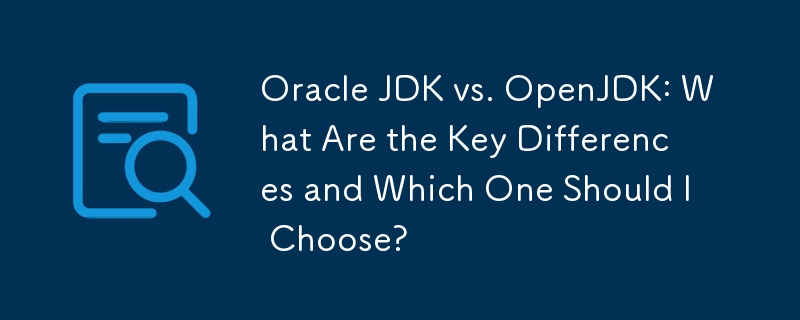 Java
Java
 javaTutorial
javaTutorial
 Oracle JDK vs. OpenJDK: What Are the Key Differences and Which One Should I Choose?
Oracle JDK vs. OpenJDK: What Are the Key Differences and Which One Should I Choose?
Oracle JDK vs. OpenJDK: What Are the Key Differences and Which One Should I Choose?

Oracle JDK and OpenJDK: A Detailed Comparison
Oracle JDK and OpenJDK are two popular implementations of the Java platform. While they share many similarities, there are some key differences between the two.
Licensing
One of the most significant differences between Oracle JDK and OpenJDK is their licensing. Oracle JDK is a commercial product and requires a paid subscription to use. In contrast, OpenJDK is open source and free to use for both personal and commercial purposes.
Source Code
Another difference between Oracle JDK and OpenJDK is their source code. Oracle JDK is distributed as a binary executable, while OpenJDK is distributed as source code. This means that OpenJDK users can view, modify, and redistribute the code as they see fit.
Garbage Collection
Both OpenJDK and Oracle JDK use the same garbage collection algorithms. However, Oracle JDK has some proprietary garbage collection features that are not available in OpenJDK. These features can provide some performance benefits, but they are not always necessary or appropriate for every application.
Performance
In general, the performance of Oracle JDK and OpenJDK is very similar. However, there may be some cases where one implementation outperforms the other. For example, Oracle JDK may have a slight performance advantage on Windows systems.
Support
Oracle JDK includes commercial support from Oracle. This support includes access to Oracle's technical experts, bug fixes, and security updates. OpenJDK does not include commercial support, but there are many resources available online from the community of OpenJDK developers and users.
The above is the detailed content of Oracle JDK vs. OpenJDK: What Are the Key Differences and Which One Should I Choose?. For more information, please follow other related articles on the PHP Chinese website!

Hot AI Tools

Undresser.AI Undress
AI-powered app for creating realistic nude photos

AI Clothes Remover
Online AI tool for removing clothes from photos.

Undress AI Tool
Undress images for free

Clothoff.io
AI clothes remover

Video Face Swap
Swap faces in any video effortlessly with our completely free AI face swap tool!

Hot Article

Hot Tools

Notepad++7.3.1
Easy-to-use and free code editor

SublimeText3 Chinese version
Chinese version, very easy to use

Zend Studio 13.0.1
Powerful PHP integrated development environment

Dreamweaver CS6
Visual web development tools

SublimeText3 Mac version
God-level code editing software (SublimeText3)

Hot Topics
 1664
1664
 14
14
 1423
1423
 52
52
 1317
1317
 25
25
 1268
1268
 29
29
 1246
1246
 24
24
 Is the company's security software causing the application to fail to run? How to troubleshoot and solve it?
Apr 19, 2025 pm 04:51 PM
Is the company's security software causing the application to fail to run? How to troubleshoot and solve it?
Apr 19, 2025 pm 04:51 PM
Troubleshooting and solutions to the company's security software that causes some applications to not function properly. Many companies will deploy security software in order to ensure internal network security. ...
 How do I convert names to numbers to implement sorting and maintain consistency in groups?
Apr 19, 2025 pm 11:30 PM
How do I convert names to numbers to implement sorting and maintain consistency in groups?
Apr 19, 2025 pm 11:30 PM
Solutions to convert names to numbers to implement sorting In many application scenarios, users may need to sort in groups, especially in one...
 How to simplify field mapping issues in system docking using MapStruct?
Apr 19, 2025 pm 06:21 PM
How to simplify field mapping issues in system docking using MapStruct?
Apr 19, 2025 pm 06:21 PM
Field mapping processing in system docking often encounters a difficult problem when performing system docking: how to effectively map the interface fields of system A...
 How does IntelliJ IDEA identify the port number of a Spring Boot project without outputting a log?
Apr 19, 2025 pm 11:45 PM
How does IntelliJ IDEA identify the port number of a Spring Boot project without outputting a log?
Apr 19, 2025 pm 11:45 PM
Start Spring using IntelliJIDEAUltimate version...
 How to elegantly obtain entity class variable names to build database query conditions?
Apr 19, 2025 pm 11:42 PM
How to elegantly obtain entity class variable names to build database query conditions?
Apr 19, 2025 pm 11:42 PM
When using MyBatis-Plus or other ORM frameworks for database operations, it is often necessary to construct query conditions based on the attribute name of the entity class. If you manually every time...
 How to safely convert Java objects to arrays?
Apr 19, 2025 pm 11:33 PM
How to safely convert Java objects to arrays?
Apr 19, 2025 pm 11:33 PM
Conversion of Java Objects and Arrays: In-depth discussion of the risks and correct methods of cast type conversion Many Java beginners will encounter the conversion of an object into an array...
 How to use the Redis cache solution to efficiently realize the requirements of product ranking list?
Apr 19, 2025 pm 11:36 PM
How to use the Redis cache solution to efficiently realize the requirements of product ranking list?
Apr 19, 2025 pm 11:36 PM
How does the Redis caching solution realize the requirements of product ranking list? During the development process, we often need to deal with the requirements of rankings, such as displaying a...
 E-commerce platform SKU and SPU database design: How to take into account both user-defined attributes and attributeless products?
Apr 19, 2025 pm 11:27 PM
E-commerce platform SKU and SPU database design: How to take into account both user-defined attributes and attributeless products?
Apr 19, 2025 pm 11:27 PM
Detailed explanation of the design of SKU and SPU tables on e-commerce platforms This article will discuss the database design issues of SKU and SPU in e-commerce platforms, especially how to deal with user-defined sales...



